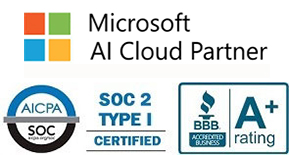IT Consulting | IT Support | Managed Services | New Jersey Computer Support Services

Have you noticed the growing number of systems designed for remote and hybrid workers, or the rise of AI automation within your managed service provider? Maybe you've been wondering what other managed services trends are on the horizon.
The managed services industry is evolving, driven by technological advancements and shifting business demands. Organizations that understand these emerging trends position themselves for enhanced efficiency, stronger security, and sustainable growth.
These five key trends are altering how businesses approach IT management and infrastructure support.
1. AI and Automation Reshape IT Management
Over 78% of businesses reported using AI to some degree in 2024. IT Management is no exception. AI and automation are revolutionizing how managed service providers deliver support. Monitoring systems that are AI-driven can detect potential issues before they cause harm, analyzing patterns in network performance, server health, and application behavior.
If you've previously struggled with keeping your systems current, then automated patch management could bring relief. There’s no delay with security responses when intelligent threat detection and automated containment protocols are employed.
As expected, this is one of the most prominent trends in managed services. The result? Faster problem resolution, predictable IT budgets, and support teams that can focus on strategic initiatives rather than reactive firefighting.
2. Cybersecurity Takes Center Stage
Cyber threats aren’t just the concern of large corporations. Businesses of all sizes are being targeted with increasing sophistication. Small and medium-sized businesses face the same persistent threats as large enterprises, yet often don't have dedicated security resources.
Managed security services now include zero-trust architecture implementation, advanced endpoint detection and response, and 24/7 security operations center monitoring. These approaches address the full spectrum of cyber risks.
Managed service providers who specialize in compliance requirements, from HIPAA in healthcare to PCI DSS in retail, are a massive asset for organizations. Managed service providers ensure systems remain both secure and compliant, minimizing risk of expensive breaches and regulatory penalties.
3. Cloud Optimization and Hybrid Infrastructure Support
Multi-cloud and hybrid infrastructure models are rapidly becoming standard practice in managed services. Businesses are now commonly leveraging multiple cloud platforms in conjunction with on-premises systems, particularly for specific applications or to meet compliance requirements.
Managed service providers deliver ongoing cloud services, including cost management, performance tuning, and seamless migration support. They ensure workloads run on the most appropriate platforms while controlling expenses through intelligent resource allocation.
This flexibility is essential for supporting remote and hybrid workforce models, enabling access to necessary resources securely from any location.
4. Remote and Hybrid Workforce Enablement
With 21.6% of the workforce working hybrid or remotely, the requirements of an IT support service has dramatically changed. Organizations need seamless collaboration tools, secure VPN access, and endpoint management from a range of locations.
Managed service providers now specialize in solutions like Microsoft 365 optimization or Google Workspace administration. They ensure remote employees maintain the same level of productivity and security as their office-based coworkers.
This includes implementing secure remote access protocols, managing mobile device policies, and providing consistent user support regardless of location. Proving that this is one of the trends in managed services that is here to stay.
5. Data-Driven Insights as a Strategic Partnership
Managed service providers are no longer just reactive support vendors; they have adapted to become strategic technology partners. They use analytics and comprehensive reporting to identify opportunities for improved IT efficiency and business growth.
These partnerships focus on helping organizations make informed technology investment decisions based on actual usage patterns, performance metrics, and business objectives. Managed service providers supply regular strategic reviews that align technology roadmaps with long-term growth goals.
This approach transforms IT from a cost center into a competitive advantage, ensuring technology investments directly support your business.
Use Trends to Your Advantage for Business Success
These trends in managed services represent a core shift in how organizations approach IT management and support. Companies that partner with forward-thinking managed service providers gain access to leading technologies, enhanced security, and strategic guidance that drives business growth.
Contact us today to discuss how to amplify your IT strategy.
SCHEDULE AN IT Assessment
About Us:
- 150+ 5-Star Google Rated IT Firm
- Microsoft Certified Cloud AI Partner
- SOC II Certified Managed Service Provider
- Better Business Bureau A+ Rated






